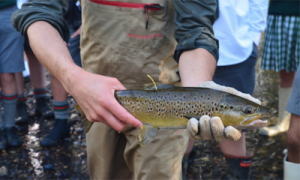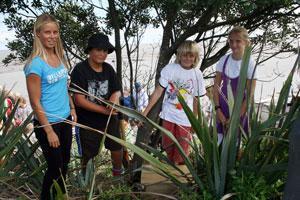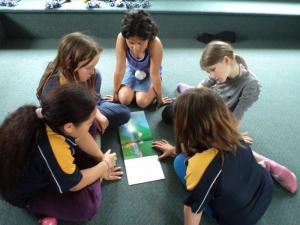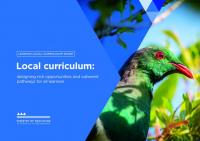Are you looking for ways to explore and develop your local curriculum? One way to get started is to identify the rich learning opportunities that exist in your own community. This blog offers some ideas, stories, and questions to help your students “learn locally”.
The New Zealand Curriculum is a clear statement of what we deem important in education. It presents a vision of our young people as confident, creative, connected, and actively involved lifelong learners and includes a clear set of principles on which to base local curriculum decision making.
Your local curriculum is the way that you bring The New Zealand Curriculum to life at your school. Designing your local curriculum involves making decisions about how to give effect to the national curriculum in ways that best address the particular needs, interests, and circumstances of your students and community.
One way to localise your curriculum is to consider your wider community as your classroom and connect your students to the local learning opportunities that are available. Learning locally is a strategy available at every school. Opportunities vary depending on a school's location but there are rich opportunities waiting outside every classroom door.
Why learn locally?
There are numerous benefits to learning locally, some of which are described below:
-
Community engagement
Learning locally connects with your students’ wider lives, and engages the support of their families, whānau, and communities. Local, meaningful contexts for learning can be used that have relevance to your ākonga.
-
Relationships for learning
Quality and collaborative relationships can be built with the people in your community, especially with your local iwi and hapū. Your students can engage in shared activities and conversations with other people, including family members and people in the wider community.
-
Identity and belonging
Learning about the people, history, stories, and places relating to your school’s geographic location will assist you to instill a deeper sense of personal identity and belonging in your students.
-
Authentic curriculum
Learning locally enables your students to get involved in authentic, engaging, hands on projects where they can develop knowledge across learning areas and build a range of capabilities for lifelong learning. Using local, real life learning experiences allows your students to explore and make connections to the world beyond the classroom and have access to technology and expertise that your school is unable to provide.
-
Participating and contributing
Learning locally enables your students to actively contribute to their community to enable beneficial outcomes for themselves and others.
School stories
Schools across Aotearoa are harnessing people, places, and resources in their communities to provide rich learning opportunities for their students. This blog brings together a collection of school stories that provide practical examples of local learning. Reflective questions are provided to help you consider ways to connect your own students to their community.
Local environmental issues
Menzies College – Localised learning at Mimihau Stream
Year 12 students from Menzies College have been catching and tagging trout in Mimihau Stream and sharing their findings with Fish and Game New Zealand. By gaining a more accurate picture of life in this waterway, students have challenged the assertion that Mimihau Stream is dead. This hands-on, localised project has encouraged students to solve problems, develop resilience, and practice teamwork, and has led to a much greater engagement in learning.
Conservation kids protecting endangered species in Nina Valley
Eighteen kiwi have been repatriated into their habitat in the Nina Valley in the Canterbury region through the efforts of Hurunui College students, who contribute to their school’s conservation work inside the classroom and through volunteering.
Oakura School – Homes for penguins
Oakura community and the Department of Conservation (DOC) had a project to do and needed some assistance. As a result of construction along the coastline of the community the little blue penguins were losing their homes. DOC approached Oakura School to see if the students would be interested in constructing and placing boxes to encourage the little blue penguins to return to the area and nest.
Guiding questions – Ngā pātai
- What natural features, flora, and fauna are defining characteristics of your community and how are they valued by different groups of people?
- How can you provide learning opportunities in, about, and for, your local environment?
- Which local people and/or organisations can you collaborate with to enable students to actively contribute to their local environment?
Local Māori history
Local histories – a student’s perspective
Arapeta Latus, a senior student at Whanganui City College, talks about the importance of hearing local history from local people, and visiting the sites of significance. Arapeta suggests that teachers build a relationship with local marae to ask kaumātua and kuia to help in setting up the process for hearing these important stories from the past.
Different perspectives emerge as students research first encounters
Students at Whitney Street Primary School in Marlborough are hearing a different side of their local history that includes first encounters between migrants and Māori and how it was experienced by local iwi.
Wairakei School – Working in partnership with Ngāti Tūwharetoa
Schools in the Taupō area, including Wairakei School, have worked in partnership with Ngāti Tūwharetoa to ensure students learn about their iwi, its history, places, and stories.
Guiding questions – Ngā pātai
- Who are the mana whenua in your school community and how can you build educationally powerful partnerships with them?
- What stories, histories, and events are important to your mana whenua?
- Collaboration is an important aspect when teaching Māori history. What are the protocols and networks you need to set up to make sharing stories and information easy for teachers and local Māori?
Local business, enterprise, and career opportunities
Partnership sparks career pathways in Hawke’s Bay
A partnership between a Hastings high school and a local engineering business is giving students valuable career opportunities – while also returning significant benefits for the school and helping to resolve a nationwide skills shortage.
Guiding questions – Ngā pātai
- What opportunities and resources could local businesses offer to enhance the learning outcomes you have planned for your students?
- What real life learning projects could you collaborate on?
- How might you connect with and grow educationally powerful relationships with local businesses and what benefits can your school bring to them?
Nā tō rourou, nā taku rourou
ka ora ai te iwi
With your food basket and my food basket the people will thrive
This closing whakataukī speaks of community and collaboration. It acknowledges that everybody has something to offer and by working together we can all flourish. When schools and their communities combine their skills, resources, and knowledge, there is greater potential to accelerate the learning of all of our ākonga.
You might like …
Leading local curriculum guide series
In order to support the progress of all students, the Leading Local Curriculum Guide series has been developed to deliberately steer your curriculum and assessment review and design decisions as you strengthen your local curriculum. It will support you to use tools to assess progress that is informative, and strengthen the partnerships you have with parents and whānau.






